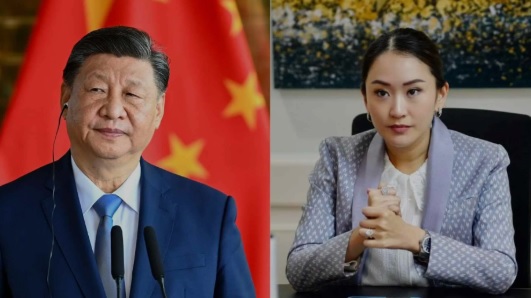Alisha Rahaman Sarkar
Chinese president Xi Jinping met Thai prime minister Paetongtarn Shinawatra in Beijing on Thursday amid fears of deportation for the 48 Uyghurs in custody in Thailand.
The Thai leader's official visit to China this week marks the 50th anniversary of diplomatic ties between the two countries. Rights groups and experts fear during the three-day visit to Beijing, the Chinese government will push the Thai prime minister to accelerate the deportation of the Uyghurs back to China.
The 48 detainees were part of a much larger group of around 350 Uyghur refugees who fled to Thailand following persecution in the northwest Chinese region of Xinjiang in 2014. The detainees have been held in immigration detention for more than a decade.
According to a New York Times report, the detained Uyghurs are forbidden contact with relatives, lawyers, or other advocates and are allegedly subjected to a different standard of care than other detainees. Thailand is not a party to the 1951 UN Refugee Convention, which leaves asylum seekers vulnerable to arrest and detention as “illegal migrants”.
The Chinese government has been accused of committing "crimes against humanity" against Uyghurs and Hui Muslims over the past decade through alleged widespread abuses and arbitrary detentions, an allegation that Beijing routinely denies as the “lie of the century”.
The UN says China has detained more than a million minority Muslims, mostly ethnic Uyghurs, since a dramatic escalation of counter-terrorism policies in the spring of 2017. China initially denied the existence of any Uyghur detention centres before defending them as “re-education centres”.
Last month, the UN human rights experts urged the Thai government to not send the Uyghurs back, warning they are at risk of torture, ill-treatment, and irreparable harm if returned.
The detainees "must be provided with access to asylum procedures and other humanitarian assistance", the special rapporteurs said in a statement, adding half of the group had serious health conditions.
"We are informed that 23 of the 48 individuals suffer from serious health conditions, including diabetes, kidney dysfunction, paralysis of the lower body, skin diseases, gastrointestinal illnesses, and heart and lung conditions,” they said. “It is essential they be provided with the necessary and appropriate medical care.”
The statement was released days after human rights groups and some Thai lawmakers raised concerns that the transfer to China of the Uyghurs was imminent. The Thai government, however, said it has no such plans.
At least 172 women and children have since been sent to Turkey and 109 were forcibly returned to China, whose whereabouts were unknown to the rights groups.
During Thursday's meeting, Mr Xi cited projects such as a high-speed railway set to link Bangkok with southwestern China's Kunming, adding that digital economy and electric vehicles were additional areas for greater cooperation.
"In the face of unprecedented changes not seen for a 100 years, China and Thailand should deepen mutual trust over strategic interests and firmly support each other," state broadcaster China Central Television (CCTV) quoted Mr Xi as saying.

